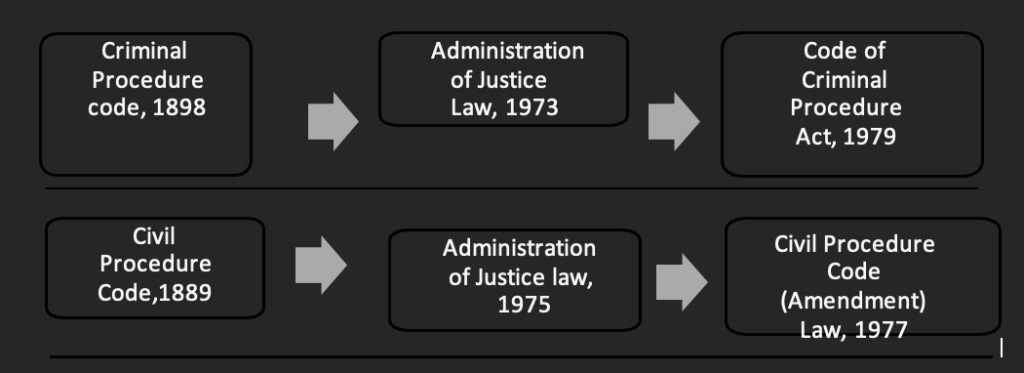Introduction to the laws in Sri Lanka
The laws of Sri Lanka have been influenced by the civil and common law systems. The Roman-Dutch law is the common law of Sri Lanka. A statute is the primary source of law. When there is no statute that is applicable, the court will see if any personal laws are applicable, and if not, the Roman-Dutch law will be applied.
I. Criminal law, procedure, and evidence

II. Constitutional law
Colebrook-Cameron (1833) and the Donoughmore (1931) constitutions were available during the British period. The Ceylon Independent Constitution, which was established in 1948, was based on the Westminister model. The Constitution of the Socialist Democratic Republic of Sri Lanka of 1972 made Sri Lanka a Republic. The Constitution of the Democratic Socialist Republic of Sri Lanka (1978)
III. Commercial and mercantile law
The English law principles are applicable to bills of exchange, sale of goods, partnerships, companies, insolvency, banks and banking, maritime matters, carriage of goods and insurance.
IV. Law of tort/ delict
Liability in the Roman-Dutch law of delict is founded on the acquilian action and the action injuriarum. There were also other remedies such as the pauperian action, aediles edict, action de pastu, actio de effusis vel dejectis, actio de suspensis. There are torts that impose liability in English law in the absence of fault or negligence The only 2 statutes in this field are The Law Reform (contributory negligence and joint wrong-doers) Act 1968 and Crown Liability in Delict Act 1969.
V. Law of contract
English law – sale of goods, insurance, carriage of goods by sea, corporation, partnerships, agency and bills of exchange, undue influence, the rectification of documents and contracts in restraint of trade, sale, hire, donation and suretyship. Roman-Dutch law – contracts for the sale of land, capacity of minors, causa.
VI. Law of property
The fundamental principles of the law of property are Roman-Dutch. The extent of the application of Dutch law has been restricted by legislation, judicial decision and the application of some of the exceptional systems of law, and to a limited extent by local custom.
VII. Law of persons
The law governing juristic persons is in general based on English principles, but birth and legitimacy are governed by Roman Dutch subject to the operation of the statute. The Marriage (general) Ordinance of 1907 deals with many areas in relation to marriage.
VIII. Law of succession
Testate succession – Roman-Dutch law, as well as statutes such as the Prevention of Frauds Ordinance of 1840, apply. Intestate succession – The Matrimonial Rights and Inheritance Ordinance will apply to those who are not governed by any personal law.
IX. Law of remedies
English law, as well as Roman-Dutch law, apply. The ultimate product as a result of the combination of these laws is the law of Sri Lanka.
